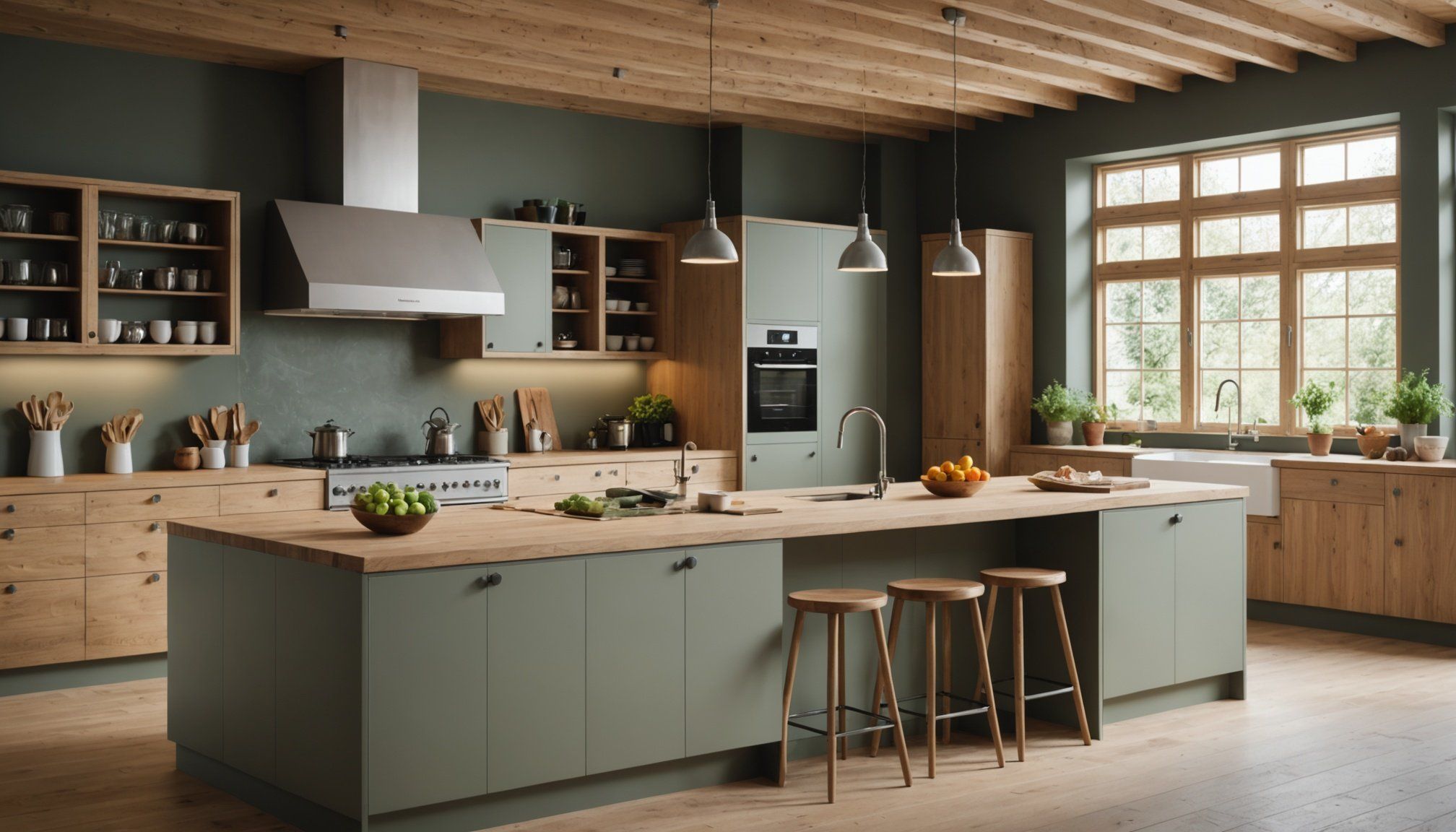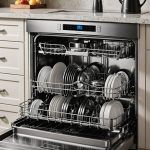Importance of Sustainable Kitchen Design
The environmental impact of kitchens is vast, ranging from excessive energy use to contributing significantly to food waste. Kitchens that adopt sustainable design measures can help mitigate this impact. For homeowners, a sustainable kitchen design offers both environmental benefits and potential cost savings.
Reducing food waste is a vital aspect of sustainable kitchen design, particularly relevant in regions like the UK where such waste is substantial. By incorporating practices that minimize waste, households can significantly decrease their environmental footprint and contribute to conservation efforts. Moreover, it lessens the burden on landfills and reduces greenhouse gas emissions associated with food decomposition.
Also to discover : The definitive handbook for choosing ideal bar stools for your kitchen island in the uk
Embracing a sustainable kitchen design involves selecting eco-friendly materials, choosing energy-efficient appliances, and optimizing kitchen layouts to maximize natural light and ventilation. These elements not only enhance the aesthetic appeal of the kitchen but also contribute to overall energy efficiency, offering long-term savings on utility bills.
Therefore, investing in environmentally conscious kitchen design is a proactive step toward a healthier planet. It enables homeowners to benefit directly from reduced costs and to take part in broader sustainability initiatives.
Additional reading : Revamp Your UK Kitchen with a Chic and Functional Breakfast Bar: Comprehensive DIY Guide
Innovative Technologies for an Eco-friendly Kitchen
Integrating smart appliances is pivotal in advancing kitchen sustainability, offering innovative solutions that ensure an efficient energy use. These appliances, such as smart fridges and ovens, not only streamline culinary tasks but also play a critical role in reducing food waste. By maintaining optimal conditions, such as temperature and humidity, these appliances extend food longevity and freshness, resulting in significant waste reduction. They can alert homeowners about expiring items, aiding in better food management.
Energy-efficient Cooking Solutions
Adopting energy-efficient cooking methods is another fundamental aspect. Induction cooktops, for example, significantly reduce energy consumption compared to traditional gas stoves. These cooktops heat only the cookware, ensuring minimal energy loss and faster cooking times. In addition, convection ovens and steam ovens distribute heat more evenly, which reduces cooking time and energy usage.
Advancements in Kitchen Gadgets
Modern kitchen gadgets further enhance sustainability by helping track food freshness and usage. For instance, smart scales and food scanners assist in precise cooking without excess, while digital humidity sensors prevent spoilage. These innovations collectively strengthen the efforts towards creating a sustainable and eco-friendly kitchen environment, fostering substantial environmental benefits.
Relevant UK Regulations and Programs
Understanding UK sustainability regulations and initiatives is essential for those adopting sustainable kitchen practices. The government has implemented guidelines to ensure that kitchen designs align with environmental protection standards. For instance, regulations encourage using energy-efficient appliances and materials with low environmental impact, supporting both sustainability and cost reduction goals.
Overview of UK Government Regulations
Key UK government regulations focus on encouraging sustainable practices in construction and operation. Regulations require compliance with standards for energy efficiency and waste reduction, impacting kitchen design choices. Utilizing sustainable materials and adhering to these guidelines helps homeowners benefit from incentives while reducing their ecological footprint.
Local Initiatives to Combat Food Waste
Local authorities often collaborate with organizations to promote food waste reduction strategies. These programs offer resources such as workshops and information on composting, meal planning, and donations, essential for building community awareness on sustainable practices. Participating in these efforts fosters eco-conscious behaviour and enhances the kitchen’s ecological impact.
Resources for Eco-friendly Kitchen Projects
For those embarking on eco-friendly kitchen projects, numerous resources are available. These include directories of sustainable suppliers, guidelines on the best sustainable kitchen practices, and support networks for navigating UK regulations effectively. These tools empower homeowners to make informed decisions, cementing the kitchen’s role in environmental conservation.
Practical Tips for Designing an Eco-friendly Kitchen
Designing an eco-friendly kitchen involves adopting sustainable design practices and selecting green materials. These tips help homeowners reduce their environmental impact while creating a functional, appealing space.
Choosing Sustainable Materials
When selecting materials for countertops and cabinetry, opt for sustainable options. This includes reclaimed wood, bamboo, and recycled metal. These materials are not only eco-friendly but also durable, offering a long lifespan and reducing the need for frequent replacements. Using low-VOC finishes can further diminish the kitchen’s environmental footprint.
Incorporating Energy-efficient Layouts
A well-planned kitchen layout maximizes energy efficiency. Place appliances strategically to minimize energy use—for instance, situating the fridge away from heat sources like ovens. Incorporating a kitchen triangle, where the stove, fridge, and sink form an efficient workspace, promotes smoother workflow and energy conservation.
Utilizing Natural Light and Ventilation
Maximizing natural light and ventilation reduces reliance on artificial lighting and air conditioning. Install large windows, skylights, or glass doors to allow sunlight to flood the space, decreasing the need for electrical lighting. Design elements, such as ventilation hoods and open plans, ensure proper airflow, aiding in maintaining a comfortable kitchen environment.
Strategies for Reducing Food Waste
Adopting effective food waste reduction strategies is crucial for creating a sustainable kitchen. Proper planning can help minimize surplus food and reduce environmental impact.
Meal Planning Techniques
Meal planning is a powerful tool in reducing food waste. By organising weekly menus and buying only needed ingredients, households avoid over-purchasing. This deliberate approach limits food excess, enhancing efficient usage. Planning meals around soon-to-expire items can further decrease waste, ensuring food is consumed before spoilage.
Food Preservation Methods
Implementing effective food preservation techniques extends food longevity. Methods like canning, freezing, or fermenting are invaluable for keeping items fresh. Storing perishables with appropriate packaging, such as airtight containers, maintains quality and prevents premature spoilage. These practices support waste reduction by ensuring food stays edible longer.
Composting and Recycling in the Kitchen
Composting transforms kitchen waste into nutrient-rich soil, offering an eco-friendly disposal method. Diverting scraps like vegetable peels and coffee grounds from landfill reduces methane emissions. Properly sorting recyclables also plays a vital role in sustainable waste management. Together, these approaches foster sustainable kitchen practices by reusing resources and minimising landfill contributions.
Case Studies and Expert Opinions
Exploring case studies and gathering opinions from experts in sustainable design offers valuable insights into creating an eco-friendly kitchen. Several UK households have successfully implemented sustainable kitchen designs, exhibiting significant reductions in energy consumption and food waste. These examples serve as practical guides for others aiming to adopt similar practices.
Expert insights highlight the importance of integrating both natural and smart technological solutions. For instance, leveraging natural lighting and ventilation alongside smart appliances can optimise energy savings and enhance the kitchen’s functionality. These holistic approaches not only improve efficiency but also significantly benefit the environment.
Analysing the effectiveness of various strategies is crucial. Many schemes, such as using recycled materials and embracing smart devices, have proven efficient in drastically reducing environmental footprints. Furthermore, experts suggest focusing on food waste reduction as a pivotal aspect of sustainable kitchen design. Insights from several studies indicate that meticulous meal planning and enhanced preservation techniques can further curtail waste, maximising the kitchen’s sustainability potential.
Through proven case studies and expert guidance, homeowners can implement strategies that yield tangible environmental benefits, promoting a comprehensive approach to sustainable kitchen design.











